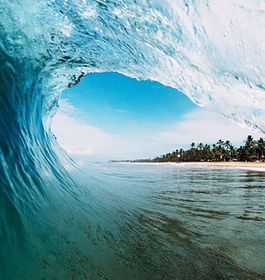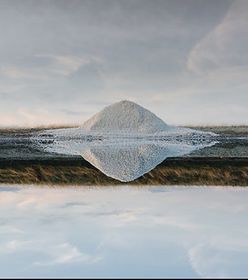
Is it helpful to use salt water for eczema? Yes, it is! My two eczema warriors have definitely experienced this before. Even though they get super dry and itchy skin right after a swim in the sea, but with a warm shower, the skin already feels cool, smooth and supple. Spread on a layer of moisturiser, the itch will be gone and they feel great, with rejuvenated skin.
Benefits of salt water for eczema – a day at the beach!
Many people have felt the healing effects of salt water for eczema, by swimming in the sea.
- Salt water is a known antiseptic, and has been commonly used for cleaning of infected wounds. This is because it is able to pull out pockets of liquids, like pus which has accumulated on the skin. It is also able to kill bacteria by drawing the water content out of their cells. At the same time it also pulls out moisture from our skin surface tissue, and can have a drying effect. Hence, it is important to moisturise after playing or swimming in the sea.
- Eczema warriors are prone to infections as there are frequently open wounds from scratching. Moreover, their immune systems are weakened from perpetually being in a heightened state, as regular substances (like some foods or dust mites, etc.) are seen by their bodies as invaders. Hence, regularly bathing or swimming in sea water can actually prevent impending infections.
- The added benefit of being at the beach is the natural exfoliation of dead skin by the sand! As the kids play in the sand, the layer of dull coloured dead skin cells come off, and what shows up is new and velvety soft skin.
- Swimming and playing in water allows my eczema warriors to work out their hearts and muscles without the usual agony and irritation from sweating. Exercise is what they need, in order to get the lymphatic system going, to flush out toxins. But the thought of the sweating and itching that comes with it is enough to put them off.
- Being in the sun is another great benefit of swimming in sea water, for people with eczema. The ultraviolet rays stimulate the skin to make vitamin D. Deficiency in this vitamin has been linked to numerous chronic health problems, from inadequate bone metabolism to higher falling and fracture risks, and osteoporosis.
- There is a psychological and emotional side to eczema that only people who have gone through it will understand. Being at sea, in nature, helps to relax and calm the mind and soul, and allows for great meditation opportunities. The state of the mind, together with stress, can be a huge trigger for eczema.
What else is in sea water

The good stuff: Beneficial minerals
Besides salt, which is essentially sodium chloride, there are a few other highly beneficial minerals that are present in quite substantial amounts in sea water, that can get absorbed through the skin. These include magnesium, sulphur, and calcium.
- Magnesium has been used in Epsom salt baths for its detoxifying and pain relieving properties. It calms and relaxes muscles, and relieves stress.
- Sulphur is a naturally occurring mineral found in abundance near many hot springs and volcanic craters. It is well-known for many benefits, including soothing many skin conditions by reducing inflammation, and being an anti-fungal agent. My son uses a cream containing sulphur to heal his scratch wounds quickly.
- Calcium is a major mineral for our bone development, as well as a co factor for some enzymes during energy metabolism. Adequate intake of calcium reduces the risks of heart diseases, obesity, and some form of cancers.
Precautions to take when swimming in the sea
For the person with eczema, here are some extra precautions:
- Oozing wounds or open wounds may sting when they first come into contact with salt water. Know yourself, and how much your pain threshold is. For your own comfort, it makes sense to postpone the trip to the beach if you are in an eczema flare that is very inflamed and angry.
- Apply sunscreen to protect yourself from too much ultraviolet rays. Choose an all-natural product that works for you.
- Limit the duration in the sea and the sun, as being in salt water for too long can be too drying for the skin, such that the harm is greater than the benefits.
- At least do a quick shower after your swim, you should not let the salt water stay on your skin too long, to continue dehydrating it.
- Moisturise right after your shower. These are our recommended mosturisers, made of all natural ingredients.
- Everyone is different. Some people do not take to salt water well. If you are one of them, then just stick with those remedies that work.
There is bad stuff in sea water too – chemical pollutants and harmful organisms
Not all seas are equal. Before swimming in the ocean, it is important to find out how good or bad the water quality in your area is. Check with your local authorities before you jump right in, crowded beaches does not mean the water is clean. Especially for people with eczema, who are inherently more sensitive than others, it pays to be more cautious.
Depending on how and where industries and agricultural farmers dispose of their wastes, coastal areas can get pretty dirty due to all sorts of human activities. Chemical pollutants are just bad, bad, bad for the eczema person. If it crosses the weakened skin barrier, it enters the body system in an instant.
Even without pollution, there are millions of microorganisms in the sea, only God knows how many species are yet to be discovered by mankind. On skin that is already compromised, or even having open wounds, it is definitely not a good idea to expose to bacteria and viruses.
If your area has dirty sea water, do not worry that you will miss out on the great benefits of salt water for your skin. You can always soak in your own salt bath at home!
Salt baths at home

There are various kinds of beneficial salt baths that you can make at home:
- Epsom salt – there is no real salt (sodium chloride) in Epsom salt. It is made of magnesium sulphate. The benefits are plenty: detoxifying, soothing for the skin, pain relief, calming for nerves, mind and soul. Use 2 cups of Epsom salt in a full bath. Read more about Epsom salt in this linked post.
- Himalayan salt – this is mined from ancient seabed, which was under the sea 100 to 200 million years ago. Over the eras, the sea dried up. Which means the minerals found in this salt are pure and uncontaminated by modern pollutants. Use 1-2 cups in your bath, to detoxify and relax.
- Dead sea salt – this salt is much more abundant in magnesium, potassium, sodium, and calcium, compared to regular sea salt. Hence, there are immense benefits from soaking in a dead sea salt bath. Among other therapeutic effects, for eczema specifically, it soothes itchy and inflamed skin, and reduces flaking significantly. 2 cups in your bath will work its wonders.
One thing to note about all these detox baths is to not stay longer than 20 minutes in the bath, as you won’t want the toxins that have been flushed out to be reabsorbed into your skin.
Final thoughts
Salt water has numerous amazing benefits. It can be used to flush out the sinuses, as a gargle when having a sore throat, as a detoxifying drink, etc. If you find that it works to use salt water for eczema, then it is in fact the simplest solution. The simplest substances from nature are what heals us. Press on, and heal your eczema naturally.

Magnesium, Sulfur, and calcium are also suggested minerals to help with other skin conditions like acne, as are antiseptics and exfolients. Everything you say here relates to skin health in general, so I have no doubt it also helps with eczema. Who knew going to the sea could be so good! Now if only I lived by the ocean…
Since I don’t live by the ocean, I found your salt bath a home section particularly helpful. I didn’t know you could just use Himalayan salt for a salt bath. It’s the best tasting and healthiest salt out there – but I’ll have to try a bath now.
Hi Shannah,
Yeah if you have a bath tub at home, you can enjoy a soothing salt bath anytime, don’t need to go to the beach. Yes, Himalayan salts are great! I absolutely love them.
I was almost saddened when I first started reading because I don’t live by the sea anymore. Thank you for writing that we can also get a salt bath at home. I’ve used Epsom salt baths and Himalayan salt for baths but haven’t tried the dead sea salt bath. I’m gonna try that one for sure 🙂
Thank you 🙂
Hi Kaeyoes,
Yes, do give Dead Sea salt a try, it’s richer in minerals than the Himalayan salt.
I love getting my exercise from swimming and water sports because of the lack of sweating! It’s a skin win-win! How bad would you say getting a sunburn is for eczema? Despite knowing I should put sunscreen on, I almost always end up forgetting. SMH. Also, you say to limit your duration. How long would you say is too long?
Hi Ashley,
A sunburn is unhealthy for us, generally because frequent over exposure to the sun increases our risks of skin cancer. So that applies to everyone, with or without eczema. Would throwing a tube a sunscreen into your towel bag help?
In relation to eczema, I would say a sunburn is bad only because it makes the skin itchy and painful, so you may tend to scratch it more. Otherwise, adequate exposure to the sun is actually a great thing for people with eczema.
For duration of sun exposure, if without sunscreen, I would say a maximum of 20 to 30 minutes. If you put on your sunscreen, and constantly re-apply it to protect yourself from the sun, then I say 3 hours is the limit I would put on my own family. But do try your best to stay out of the mid-day sun. So between 12 noon or a bit earlier, until about 3pm, I would try to stay in the shade. But if we’re talking about totally soaking in sea water, I guess I wouldn’t exceed 45 minutes in total.
Hello! I didn’t know that Epsom Salt wasn’t actually salt. I thought it at least had a salt substance in it. I also didn’t know that there is bad sea salt water for individuals with eczema. I thought all of it would be the same. The other salt baths are good ideas for anyone to use when they want to relax and recover in a bath. I can tell that epsom salt relieves muscle pain and helps me sleep better. Best wishes, Rachel
Hi Rachel,
Thank you for dropping by. Yes, having a bathtub at home is definitely a great luxury, you can just soak and relax anytime you want.
I never would’ve thought of this! I used to have eczema on my hands and arms when I was younger and we just used a lot of calamine lotion. It makes a lot of sense though because salt water has so many healing properties.
It’s definitely smart to check out the water quality before you jump in, even for those without eczema. Nobody wants to swim in dirty water!
I love the idea of at-home salt baths. It saves a trip to the beach and can be used all year round. Even though my eczema has cleared up now that I’m older, you’ve reminded me of the many benefits to salt baths, so I will have to give one a go soon!
Hi Taylor,
Yes, salt baths are great stuff for anyone, not just for eczema. Enjoy!!
Dear Joo,
As a pharmacist I read your website article with great interest and love the way you explained in simple terms how salt water benefits those suffering from eczema and you caution individuals with eczema to check the water quality of the area in which they are swimming. You are absolutely right to state that exfoliation from the sand allows the regenerated new skin cells to rise to the surface and sloughs off the older cells and I like the way you also brought in the psychological manifestations of the disease and the benefits of relaxation and stress reduction.
Looking at the formulation link you provided for your son’s Moogoo MSM cream, I would further amplify the discussion by saying that the sulfur content of the MSM in the cream can be used by the body to maintain normal connective tissues. Additionally, MSM has also exhibited possible anti-inflammatory activity and has been reported to alleviate allergies, arthritis, GI upset, musculoskeletal pain, and to boost the immune system. It also possesses antimicrobial effects against a host of nasty organisms. The Zinc Oxide you’re using is also anti-inflammatory and does a marvelous job of locking in moisture and keeping out pathogens. Kudos to you for doing the research to bring healing to your warrior!
Best to you all!
SharonRPh
Hi SharonRPh,
Thank you for your insightful discussion, and for sharing these precious information! If only all pharmacists were as knowledgeable as you! Then we would all be using more natural products, instead of loading up on synthetic drugs. And the world would be a much better place.
Great article! I didn’t realize how ocean water could really help with eczema, but it definitely makes sense how it could help with cleaning and cooling the skin. My friends aunt has eczema, and while she does love/hate travelling down south, she never really goes in the ocean. I’m going to suggest to her some of the at home remedies that you mentioned here and I will let her know that going in the ocean will be more beneficial to her than just the pool. thanks for the great info!
Hi Nicki,
No problem, I’d be delighted if the information here could benefit your friend’s Aunt!
Hello, my name is Brandon. I have a case of severe to extreme eczema and I was just wondering about something. I regard saltwater as a significant benefactor and remedy for my ailment, especially when I have austere inflammation. I go to Jacksonville beach, and occasionally Daytona Beach, in Florida, but the water just seems to make my skin much worse. Prior to these beaches, I was in Naples Beach and my skin was healing so much better. I do not know whether it is the water quality or something else that is exacerbating my skin in Jacksonville. Could you please explain or discern why, exactly, my skin is undergoing severe inflammation beacuse of Jax beach water and Daytona beach water, whereas at Naples beach, my skin was much better?
Hi Brandon,
There are many things that can be affecting water quality. Like pollution from agricultural activities, chemical discharge from industries, and even naturally occurring microbes that live in the water could have an effect on us. Unless you have access to the water quality reports of these areas, conducted by the local environmental agencies, otherwise we will never know.
The good thing is you know these waters are no good for your eczema. So I would suggest you stay away from Jacksonville beach and Daytona Beach, at least try not to get into the waters there. And since salt water seems very beneficial to you, make yourself a salt bath at home, then you won’t be affected by water quality.
Dead sea salt and Himalayan salt are great for our skin. Even if you do not have a bath at home, you can buy a portable one, those plastic full size tubs that can take a grown up.
Do let me know if there is anything else I can help you with.